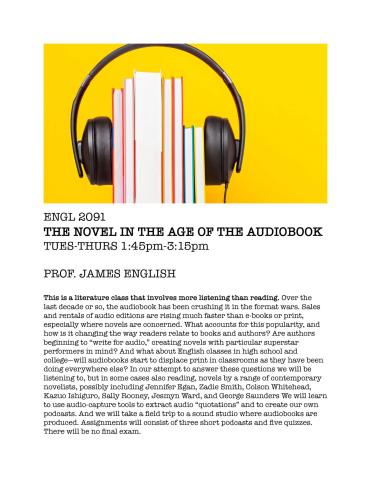Contemporary Literature: The Novel in the Age of the Audiobook
Description: This is a literature class that involves more listening than reading. Over the last decade or so, the audiobook has been crushing it in the format wars. Sales and rentals of audio editions are rising much faster than e-books or print, especially where novels are concerned. What accounts for this popularity, and how is it changing the way readers relate to books and authors? Are authors beginning to “write for audio,” creating novels with particular performers in mind? And what about English classes in high school and college—will audiobooks start to displace print in classrooms as they have been doing everywhere else?
In our attempt to answer these questions, we will mainly be listening to, but in some cases also reading, novels by a range of classic and contemporary novelists. Our approach will be experimental and exploratory, and we will assume no previous experience or expertise in the audio format. We will start by reading a short story by the award winning fiction writer George Saunders, and then listening to two audio versions of the story: one performed by a professional actor, and the other by Saunders himself. What is it that we want from a recorded reading of a work of literature? Are there good reasons for authors to read their own work, even if they lack professional training and background in vocal performance? Or should authors get out of the way and let professional voice actors do their thing? And what makes one professional performance better than another? Is it important that the performer share the race, class, nationality, gender, sexuality of the author and/or narrator? Can the online reviews and 5-star ratings provide helpful guidance to the best available recorded performance, or are they biased/rigged to mislead us?
Based on our discussion of the Saunders readings, the class will decide together what to listen to next, choosing from a list of suggested texts that includes classic novels by Jane Austen and Virginia Woolf as well as more contemporary works by Toni Morrison, Margaret Atwood, Suzanne Collins, Jennifer Egan, Susan Choi, Jesmyn Ward, John Scalzi, Andre Alexis, Emily St John Mandel, Kazuo Ishiguro, and others. We will try to choose shorter works, and we'll experiment with faster playback speeds to see if we can reduce listening time without reducing our comprehension or pleasure. (Some life-hackers claim to consume audio content at 6 times the normal speed!)
In the first two weeks of the semester we will also do some research into the pluses and minuses of different vendors and platforms: Is it possible to avoid Amazon's dominant subscription service, Audible, or are we hopelessly trapped by the business model of the Everything Store? What are the advantages and disadvantages of smaller competitors like Libro.fm? What audiobooks are available free from Penn Libraries, or from the mighty Free Library of Philadelphia, and how do we access them? Should we consider the free, amateur recordings on LibraVox? And assuming we do have to buy some of the audiobooks we're going to be studying, what kind of ownership will we have? What are the technical and legal constraints on how we store them, play them, copy them, share them, remix them? While this is not a class in sound technology, we will learn to use simple audio-capture tools to extract audio “quotations” and to create our own little podcasts. And we will take a field trip to a sound studio where audiobooks are produced. Assignments will consist of two short audio presentations, a few quizzes, and a project that can take various forms, including creative writing, a slide show, an edited interview, or a conventional essay. There will be no final exam.
You will probably need a smart phone for this class, although there are work-arounds for the truly phone-averse. Mask wearing is optional unless a majority of students in the class prefer otherwise.
Location: Fisher-Bennett 244
Office Hours: Fisher-Bennett 311, Wed 2:30-3:30, Thurs 12:30-1:30
(or email for an appointment: jenglish@upenn.edu)
Syllabus:

 Department of English
Department of English
